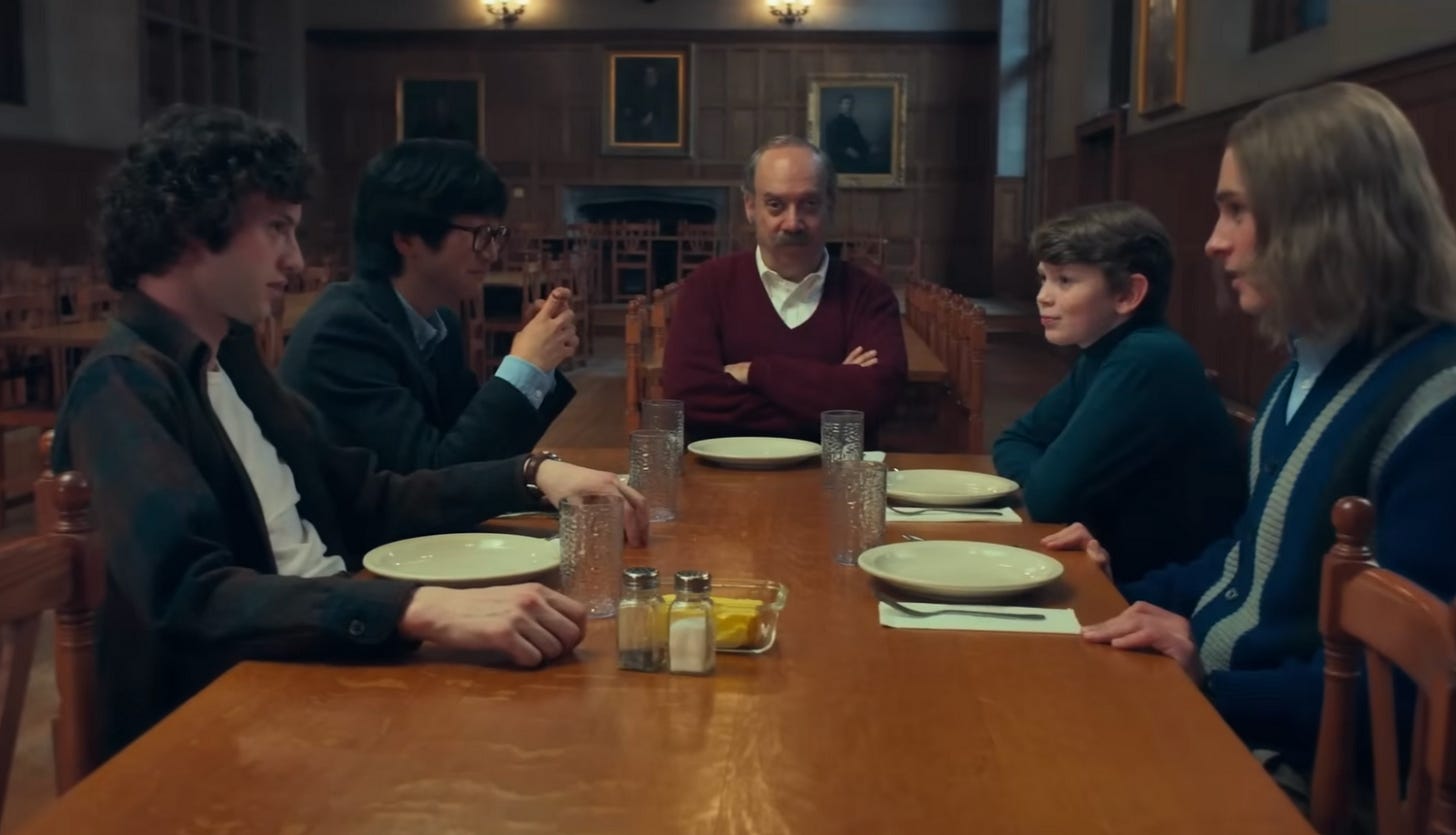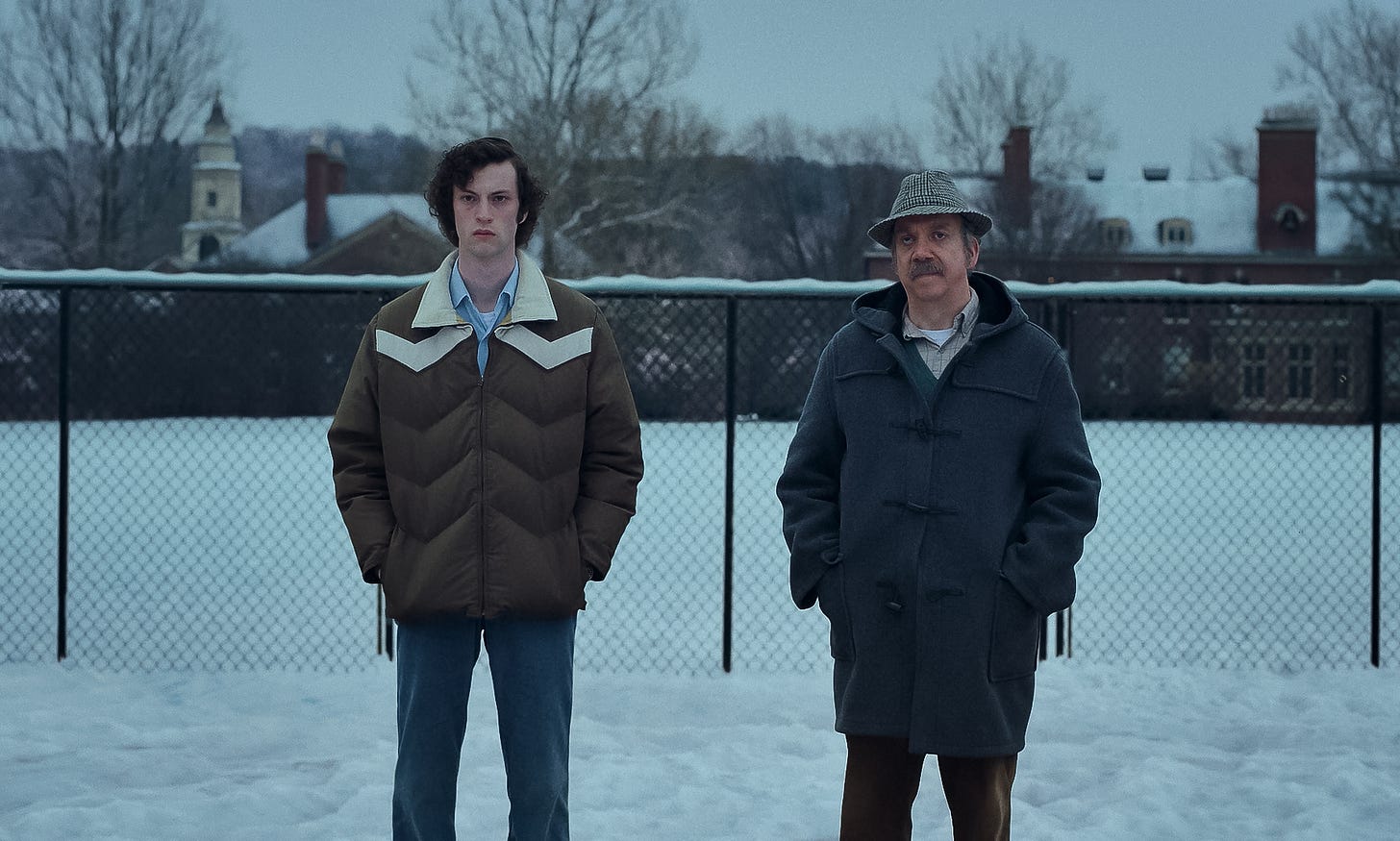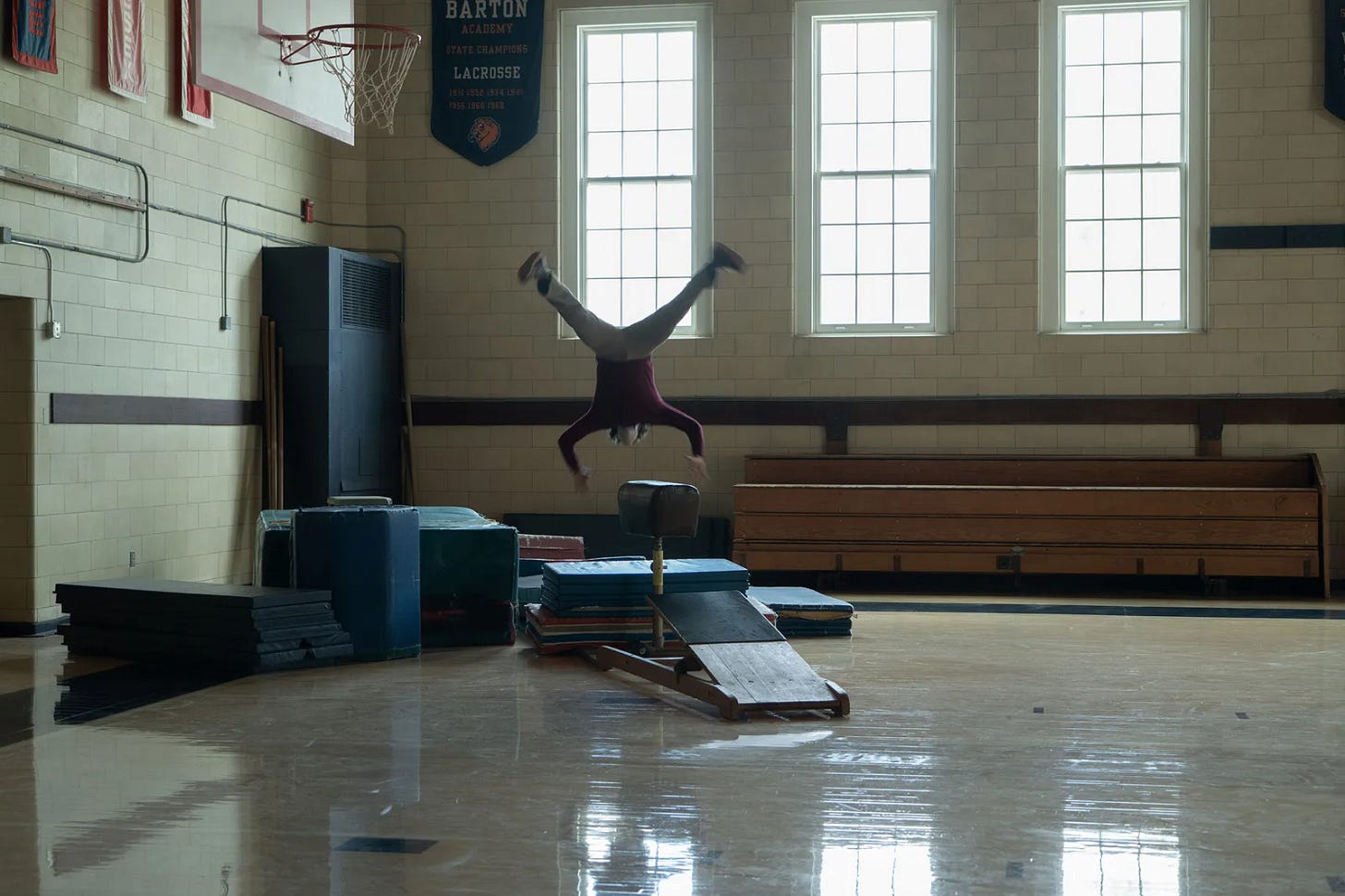The Holdovers, pt. 2
The Intergenerational Christmas Classic You Didn’t Know You Needed This Year
I am so excited to introduce Supporting Man, a new column written by my very own husband, Ben Wright!
When Ben and I first met, we connected over our love of watching and talking about movies and television. On our first date, Blade Runner 2049 was the topic of conversation. On our second date, we watched Greta Gerwig’s Little Women. We can spend hours analyzing and dissecting. For us, the viewing experience isn’t complete without it!
So I’m thrilled that Ben will be sharing his thoughts, analyses, and critiques of films with strong supporting (and leading) male actors!
For his first column, he has written about the Holdovers, which he hasn’t been able to stop talking about since we saw it. I think we’ll be watching it again during Christmastide.
This piece does contain spoilers, so if you haven’t seen the film yet, bookmark this newsletter, go watch the movie, and then come back to it!
- Heather
The Holdovers may be my favorite movie of the year. It is clever, irreverent, heartwarming, heart wrenching, and dangerously subtle. It would be easy for someone to walk away and take only the surface level viewing from this film but The Holdovers asks a vital question: What do you do when you’ve been left behind?
Paul Hunham, masterfully played by Paul Giamatti, is the crotchety anti-Robin Williams loved by all in Dead Poets Society. Students at Barton, where this story occurs, would more likely call Hunham “Dictator, my dictator!” instead of “Captain, my Captain!” And would most likely receive a detention for their sass. He is hated by students, and tolerated by the administration as a relic of a past academic era.
Angus Tully, portrayed so honestly by Dominic Sessa (discovered for this film), is an angsty teenager who is one mistake away from being sent to bootcamp by his recently divorced and remarried mother. He doesn’t get along with many of his classmates and is distraught by the fact that his mother would rather spend the Christmas break with her new husband than take him away as promised.
Mary Lamb, soulfully charactered by Da’Vine Joy Randolph, is the school’s head cook. She is revealed in the film to have survived her son, a prior student at Barton, who died in the Vietnam war. This is her first Christmas without him and she wants to remain closest to the place they spent the most time together before his untimely death.
Although the title describes their position at the school over the holiday break, Director Alexander Payne skillfully explores the essence of what it means to be a “holdover” through each of these characters.
Hunham is a holdover from a bygone era of academic rigor and manly honor, whose stilted conversations involving references to ancient philosophers, mythology, and a litany of Latin quotations will have you laughing, cringing, and wanting to experience more of the era from which he comes.
Angus believes that he represents the remnants of his mother’s failed marriage to a man who has been institutionalized. He feels that he has been left behind so that she can continue her life with a new man, excluding Angus and his biological father. He remains at school and is the focus of care from the film’s surrogate parents, and the theme of found family is explored here to great effect.
Mary embodies potentially the most difficult aspect of being left behind, not by an institution or academic culture, not by a mother, but as a mother by her deceased child. Her grief and sorrow, matched only by her no-bull-shit attitude and winking affection, are palpable.
Each of them discovers through their forced proximity to one another how to move on, accept the world, and accept themselves in it. The tagline of this film is “Discomfort and Joy” and is a poignant reminder that, although these characters believe that God, the universe, or their own life decisions are transpiring together against them to make their Christmas break the worst one imaginable, it is through their forced proximity that they grow individually and as a family.
Within the film, there is a wonderful scene where Angus puts Paul on the spot in front of one of Paul’s old school mates, egging him on to share all the amazing things he has accomplished and is accomplishing. Paul lies and later Angus calls him out for it. Paul’s response is that his old colleague is not entitled to his story. His self-protective barrier is up, the same one he uses on his students and the school faculty. Paul is a man intensely passionate about sharing history but shrinks back from the opportunities to share his story.
However, Paul finally lets his guard down with Angus after all they have gone through together and shares what really happened in his life. Through this vulnerability, an authentic connection with Angus begins to grow. Because he has shared his failures, shortcomings, and regrets, Angus also lets his guard down and the two begin to see themselves in each other.
All of this occurs as Mary works through her own grief. She uses Angus’s trip to Boston as an opportunity to visit her pregnant sister, Peggy. Before they leave the school, Mary pulls a hat box from her closet, which Payne has already shown the audience in earlier scenes and teased us with the mystery of what is inside.
When Mary is alone in the guest room of her sister’s apartment, she opens the box. Her son’s baby shoes and clothes are revealed. Quietly, she begins putting them in her sister’s clothes drawer. It is a moving scene, showing the kindness and resilience of a woman who deeply cares for those around her. Later in the film, Mary comforts Angus in a time of deep anxiety for him. It is my belief that, had she not processed the grief we see her move through in this film, she would not have had the emotional space to care for someone else’s child as her own.
There is a rightness to this film that I love. Hunham and Lamb are forced to play a kind of mother and father to Angus. Their roles, as they muddle through the ups and downs of holding boundaries, supporting one another, making concessions, and molding the future and self-image of their adoptive child perfectly mirrors what it means to be a mentor, role model, and parent.
Angus’s role is simply to receive — not passively, not as a birthright, or a privileged member of Barton Academy, but actively receive the correction and affection of his elders. It is the simple yet profound (and deeply difficult) role of youth. Paul lectures Angus and Angus lectures Paul. At first, neither hears the other, but as the film progresses and their connection deepens, each one’s corrections find their marks.
In my own life, I have worked at an inpatient rehab for teenage boys. Although it is no Barton, last winter I spent the week of Christmas with these teenagers. This film perfectly portrays the anger, hurt, desire for connection, and ridiculous means that teenage boys use to try and get that connection more exactly than I could ever explain on my own.
I am not a father but perhaps this film speaks to me more so because I have been a caregiver to children that are not my own. The frustration, the fear, the labor of love that is seeing the humanity in someone whose brain is not yet fully developed and having to deal with the consequences of that someone’s behavior gives me a kinship to Hunham that, as a film goer, is rare and deeply special.
This Christmas, after you’ve watched The Holdovers, when you’re sitting at the dinner table with your parent or child, aunt or niece, uncle or nephew, approach them with curiosity and a willingness to hear their story and share your own. The discomfort may be worth the joy you find.
I will leave you with a wonderful quote from Paul Hunham, who shares his thoughts during a history museum tour with Angus, for you to meditate upon before encountering friends and family this year:
There's nothing new in human experience, Mr. Tully. Each generation thinks it invented debauchery or suffering or rebellion, but man's every impulse and appetite from the disgusting to the sublime is on display right here all around you. So, before you dismiss something as boring or irrelevant, remember, if you truly want to understand the present or yourself, you must begin in the past. You see, history is not simply the study of the past. It is an explanation of the present.
May you have a Merry Christmas and a Happy Holdovers!








